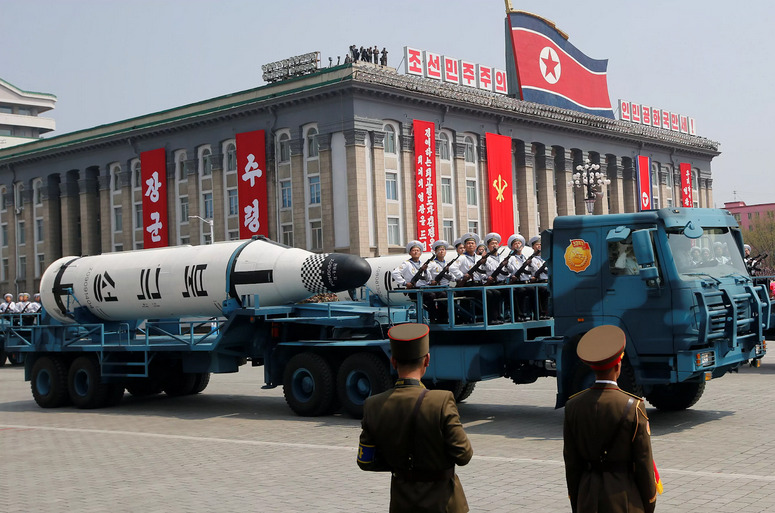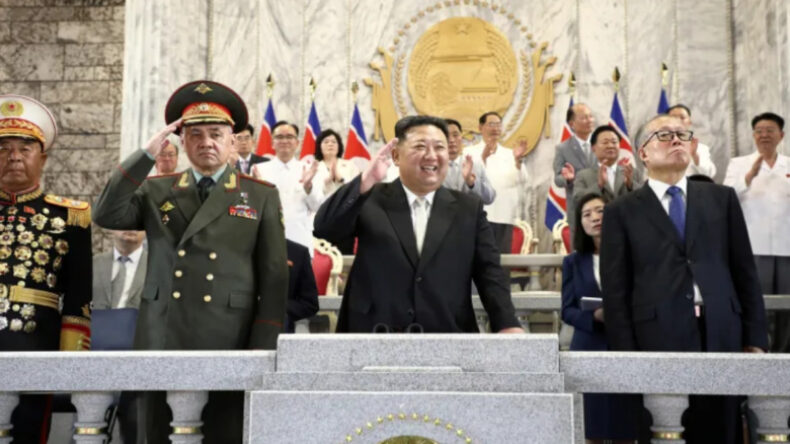North Korean leader Kim Jong-un displayed his military strength during a recent military parade in Pyongyang, where he showcased his country’s most potent nuclear-capable missiles. The parade marked a significant war anniversary and also saw the presence of high-level Russian and Chinese delegates, signifying North Korea’s efforts to strengthen ties with its authoritarian allies and counter pressure from the United States. The event occurred amidst escalating tensions on the Korean Peninsula. North Korea increased its weapons tests, and the U.S. responded with strengthened military exercises and nuclear contingency planning with South Korea.

Historic Partnership with Russia
Russian Defence Minister Sergei Shoigu praised the partnership between Russia and North Korea during a meeting with his North Korean counterpart, Kang Sun Nam, in Pyongyang. Both nations share a common border and have a long history of cooperation. The conference aimed to bolster cooperation between their defence ministries and foster strategic mutual trust.
Chinese Delegates Join the Parade
In a rare diplomatic opening since the pandemic’s start, North Korea invited delegates from China and Russia to the military parade. Chinese ruling party official Li Hongzhong and Russian Defence Minister Sergei Shoigu stood alongside Kim Jong-un during the parade, signalling their countries’ support and partnership with North Korea.
Show of Military Strength
The parade showcased a grand display of North Korea’s military might, featuring goose-stepping soldiers, tanks, and intercontinental ballistic missiles. Newly developed surveillance and attack drones were also part of the parade. For the finale, North Korea rolled out flight-tested ICBMs, the Hwasong-17 and Hwasong-18, with ranges capable of reaching deep into the U.S. mainland.
Escalating Tensions
The parade and North Korea’s continuous weapons tests come when tensions on the Korean Peninsula peak. The U.S. and South Korea have been strengthening military exercises and nuclear contingency planning in response to North Korea’s actions, leading to mutual verbal threats of destruction.
Significance of the 70th Armistice Anniversary
The parade marked the 70th anniversary of the armistice that stopped fighting in the 1950-53 Korean War. The truce was never replaced with a peace treaty, leaving the Korean Peninsula in a technical state of war. North Korea sees it as a victory in the “Grand Fatherland Liberation War.”
International Reactions
U.N. Secretary-General Antonio Guterres expressed concern over the growing “nuclear risk” on the Korean Peninsula and called for the resumption of diplomatic contacts to nurture an environment conducive to dialogue. The presence of Chinese delegates at the parade raised questions about Beijing’s support for North Korea’s nuclear-capable missiles.
The Importance of Diplomatic Solutions
As the world watches developments on the Korean Peninsula, diplomatic solutions are crucial to easing tensions and promoting regional stability. Dialogue between North Korea and the international community, including the United States, South Korea, and other concerned nations, is essential to resolve the longstanding issues peacefully.

Challenges in U.S.-North Korea Relations
U.S.-North Korea relations have been characterised by decades of mistrust, hostility, and nuclear standoffs. The lack of formal diplomatic ties between the two countries has complicated efforts to find common ground and address security concerns. As North Korea continues to advance its nuclear program, the U.S. has responded with various forms of pressure, including economic sanctions and military displays of strength.
Russia and China’s Involvement
The presence of Russian and Chinese delegates at the military parade indicates their continued support for North Korea and serves as a diplomatic signal of their alignment with the regime. Russia and China have maintained friendly relations with North Korea despite international sanctions and condemnation. Their involvement in the parade sends a clear message about their strategic interests in the region.
The Role of International Sanctions
International sanctions have been a critical tool the international community uses to pressure North Korea to abandon its nuclear weapons program. However, the effectiveness of these sanctions has been debated, as North Korea has shown resilience and found ways to circumvent the restrictions. The presence of Russian and Chinese delegates at the parade raises concerns about potential violations of existing sanctions.
Security Concerns in the Region
The escalating tensions on the Korean Peninsula have raised security concerns for the countries directly involved and neighbouring nations. South Korea, Japan, and other countries in the region have closely monitored North Korea’s actions and worked to enhance their security measures. The risk of accidental escalation and miscalculations remains a constant worry for regional stability.
The Importance of Diplomatic Engagement
While military displays and shows of force may effectively garner attention, they are unlikely to lead to lasting solutions. Diplomatic engagement, dialogue, and negotiations are essential to address the root causes of tensions and find peaceful resolutions. The international community must create an environment conducive to meaningful talks and de-escalate the current situation.
The military parade in Pyongyang, showcasing North Korea’s powerful nuclear-capable missiles and attended by high-level Russian and Chinese delegates, underscores its determination to assert its military strength. As tensions on the Korean Peninsula continue to rise, diplomatic solutions and dialogue are crucial to promoting stability and finding peaceful resolutions to the longstanding issues. The involvement of Russia and China adds complexity to the situation and highlights the need for coordinated international efforts to address security concerns in the region.













